|
|
|
Sort Order |
|
|
|
Items / Page
|
|
|
|
|
|
|
| Srl | Item |
| 1 |
ID:
108821
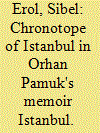

|
|
|
|
|
| Publication |
2011.
|
| Summary/Abstract |
In his memoir Istanbul, Orhan Pamuk argues that Istanbul is the site of intense hüzün (melancholy) caused by the loss of the Ottoman Empire. Furthermore, like other inhabitants of the city, that is, Istanbullus, his life is imbued with this inescapable melancholy. Taking issue with the apparent anachronism of Pamuk's historical argument, I show how he constructs and naturalizes this association between Istanbul, melancholy, and loss of empire by creating a literary genealogy for his claim. Using the Bakhtinian concept of chronotope (a schema that recognizes and explains the patterns of fusion of time, space, and emotion as thematic constellation or narrative pattern), I argue that what Pamuk identifies in and derives from the writings of his predecessors is the chronotope of Istanbul. I show how Pamuk constructs the hybrid literary canon and tradition (that references Balzac and Joyce as much as it does Beyatl? and Tanp?nar) in which he locates himself in the process of deriving this chronotope.
|
|
|
|
|
|
|
|
|
|
|
|
|
|
|
|
| 2 |
ID:
160642
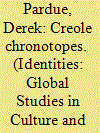

|
|
|
|
|
| Summary/Abstract |
The emergence of Kriolu or Cape Verdean Creole as a black identity should be understood in terms of chronotope, a dynamic iteration that combines time and place in the name of collective identity. The case of Cape Verdean migrants in Lisbon, Portugal, contributes to current debates on blackness as a ‘becoming’ and a complex set of practices by underscoring the role of encounters, both mundane and structural, in racialized formations. I draw from my fieldwork with Cape Verdean rappers and archival research in Lisbon between 2007 and 2013 to suggest that the particularities of Kriolu hold general theoretical lessons on the importance of migrancy and, by extension, space and temporality, in the process of racialization.
|
|
|
|
|
|
|
|
|
|
|
|
|
|
|
|
| 3 |
ID:
172374
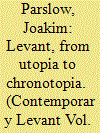

|
|
|
|
|
| Summary/Abstract |
This essay responds to this special issue’s challenge of thinking the Levant through Bakhtin’s notion of the chronotope, with a theoretical reflection on the potentials and limitations of chronotopic thought in social and historical scholarship. The essay is structured around two questions. First, given the overwhelmingly literary associations with which we tend to approach Bakhtin’s thought today, is the chronotope a tool for literary analysis only, or is it applicable to other forms of communication, cognition, and action? Second, what implications does chronotopic analysis have for scholarship that seeks methods of analysing and writing about the Levant in a historically and politically responsive way? Should chronotopes always be understood as the a priori horizon of meaningful narration, as frameworks that make certain plots, events, interpretations, and actions possible while precluding others, or are they also an observable and manipulatable aspect of communication, one that can be subject to the quotidian equivalent of authorial intention, creative reception, and political contestation? Placing the chronotope in the context of Bakhtin’s earlier philosophical project, I argue that although the chronotope facilitates the reflexivity and subversiveness which Bakhtin sees as defining and ethically necessary achievements of modern discourse, these characteristics are both self-limiting and morally ambiguous.
|
|
|
|
|
|
|
|
|
|
|
|
|
|
|
|
| 4 |
ID:
172375
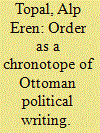

|
|
|
|
|
| Summary/Abstract |
This article proposes the concept of order as a major chronotope of Ottoman political writing which has shaped temporal projections such as decline and renewal from the seventeenth century onwards. In chronological order, I discuss the seventeenth-century debates on breakdown of social order and emergence of the sense of decline, and the eighteenth-century literature on Khaldunian concept of nomadic versus sedentary forms of habitation and spatiality of the debates over moral degeneration. The urban space of Istanbul, both material and abstract, as a political and social setting also figures prominently in these discussions and shapes Ottoman perceptions of the European city. Through a discussion of the chronotope of order I also challenge pervasive narratives of Westernisation and progress in favour of indigenous cyclical narratives of restoration and renewal.
|
|
|
|
|
|
|
|
|
|
|
|
|
|
|
|
| 5 |
ID:
123054
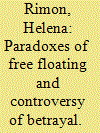

|
|
|
|
|
| Publication |
2013.
|
| Summary/Abstract |
Throughout the 1900s, intellectuals have been defined as a "privileged minority" (according to Chomsky), or as outsiders, whose "free floating" condition (Mannheim) guarantees their functioning as "custodians of values like reason and justice" (Hofstadter). Julien Benda accused intellectuals of betraying this mission. But, perhaps, betrayal is built into the very nature of their privileged position; perhaps, by pretending to be "free floating," generations of intellectuals have actually been constructing predictable paradigms, using calamity as a new kind of raw material for the old myth of lucrimax (Etkind). The tragic experience of Russian intellectuals provides us with fresh insight for this discussion.
|
|
|
|
|
|
|
|
|
|
|
|
|
|
|
|
| 6 |
ID:
124914
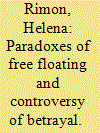

|
|
|
|
|
| Publication |
2013.
|
| Summary/Abstract |
Throughout the 1900s, intellectuals have been defined as a "privileged minority" (according to Chomsky), or as outsiders, whose "free floating" condition (Mannheim) guarantees their functioning as "custodians of values like reason and justice" (Hofstadter). Julien Benda accused intellectuals of betraying this mission. But, perhaps, betrayal is built into the very nature of their privileged position; perhaps, by pretending to be "free floating," generations of intellectuals have actually been constructing predictable paradigms, using calamity as a new kind of raw material for the old myth of lucrimax (Etkind). The tragic experience of Russian intellectuals provides us with fresh insight for this discussion.
|
|
|
|
|
|
|
|
|
|
|
|
|
|
|
|
| 7 |
ID:
172378
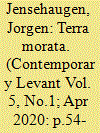

|
|
|
|
|
| Summary/Abstract |
When Menachem Begin, Israeli prime minister and founder of the Likud party, formulated Israel’s claim to the West Bank, he did not utilise the classic terra nullius settler argument. Instead, his ideological claim was that the land was a terra morata, a territory which had been in a state of ‘extratemporal hiatus’, to borrow a term from Bakhtin. This was illustrated through his insistence on using the Biblical names Judea and Samaria to denote the West Bank. The Zionist claim to the land was thus not that it lacked a sovereign, but rather that the sovereign had returned. The Israeli occupation was thus construed as a resumption of history, while the Palestinians were placed outside history, negating their historical and contemporary claim to the land. This article analyses how Begin’s worldview played out by investigating the self-rule proposal for the Palestinians which he launched in 1977. This proposal (if implemented) would have postponed any claims of sovereignty over the territory indefinitely, while ensuring that the Palestinians gained no national autonomy. In essence, Palestinian self-rule was a sleight of hand. For Begin the West Bank (and Gaza) were eternally Jewish territories, and the Palestinians mere residents on the land. Unlike Israeli settlers, they were not considered to be of the land.
|
|
|
|
|
|
|
|
|
|
|
|
|
|
|
|
|
|
|
|
|